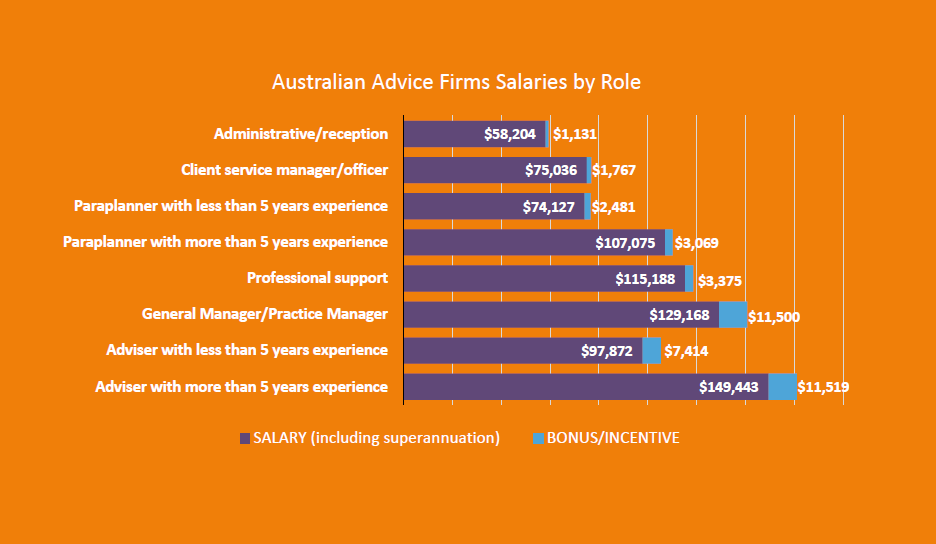While the AFA/FPA merger result was big news, our article on a new report released by well-known industry services group, Business Health, which outlines average salaries for advisers and paraplanners in Australia gets our nod for the Riskinfo Story of the Week…
On average, each Australian advice practices employs 2.7 experienced advisers, with the average salary for an experienced adviser now just under $150,000, a compensation survey of advice firms has found.
A report by Business Health entitled Swimming at the Deep End of the Talent Pool: Understanding salary & benefits packages currently offered to employees in Australia’s advice firms says advisers with more than five years’ experience represent the most expensive role within the business. Almost 100 firms contributed to the data.
Business Health says that while the $150,000 varied little across the eastern states ($153,668 in New South Wales, $150,333 in Victoria and $153,774 in Queensland), the salary for experienced advisers working in South Australia, Western Australia or the Northern Territory is significantly lower at $132,327.
…the salary paid to experienced advisers employed by smaller practices …is well below those working in a larger firm…
The report also notes that the salary paid to experienced advisers employed by smaller practices ($127,313) is well below those working in a larger firm ($154,771).
“Similarly, those located in a regional/rural area earn less than their city/metropolitan based peers – the average salary for experienced regional advisers is $140,214 versus $153,656 for senior city-based advisers.”
Business Health says that interestingly, when it comes to incentive/bonus payments for experienced advisers, “…this city/rural divide is not apparent. Over the past 12 months, the average city-based experienced adviser received a bonus payment of $11,365 which was slightly lower than the regional average of $11,857.”
However, the report says, bonus payments do vary widely based on practice size – the large firm average is $12,701 compared to $6,608 for the smaller businesses – and across states.
“Experienced advisers located in NSW received the highest average incentive payment ($13,836) followed by Queensland ($10,781), Victoria ($10,667) and South Australia/West Australia/Northern Territory ($8,489).
Junior Adviser
…less than half …of the firms actually employ junior/less experienced advisers…
Business Health says the average salary for more junior advisers (those with less than five years’ experience) is $97,872. However, less than half (42%) of the firms actually employ junior/less experienced advisers.
“The salary difference between city and rural based firms identified above is also reflected in junior adviser salaries – the salary for less experienced advisers operating in a metropolitan business is $101,157 compared to $89,250 for those based in a regional area.”
Similarly, junior adviser salaries also varied widely across states:
- $106,722 in Victoria
- $102,036 in New South Wales
- $90,200 in SA/WA/NT
- $87,214 in Queensland
Perhaps to account for the higher base salary being paid, the average bonus payment received by junior advisers in Victoria was well below the other states, at $5,556 compared to $8,000 plus in all other regions, the report says.
“It is also interesting to note that almost half (47%) of the firms that employ a junior adviser did not actually pay a bonus/incentive payment during the past 12 months.”
General Manager/Practice Manager
Business Health says the average salary for a General Manager/Practice Manager is $129,168 “…but this was skewed somewhat by New South Wales where the average salary is $172,500 and nationally the average incentive payment is $5,609.”
…while 58% of city-based firms employ a person in this position, this drops to just 27% for practices located in a regional/rural area…
The firm says that while 58% of city-based firms employ a person in this position, this drops to just 27% for practices located in a regional/rural area.
“Additionally, the remuneration paid to regional General Managers/Practice Managers is significantly lower, their average salary is $118,310 compared to $131,107 for city-based firms and their average bonus payment is just $1,900 versus $6,272.”
Professional Support
Business Health says that in this context Professional Support includes compliance managers, investment consultants, technology managers and marketing managers.
“The average salary paid for these roles is $115,188 and again NSW was the outlier at $168,750. Interestingly, there is very little difference between the metropolitan and rural average Professional Support salaries; $113,125 for city-based firms versus $119,313 for regional practices.”
Senior Paraplanner
…Over half of all practices currently employ a senior paraplanner…
Over half of all practices currently employ a senior paraplanner (those with more than five years’ experience) and at $107,075, their average salary now exceeds that of a junior adviser.
Business Health says perhaps reflective of limited supply, regional firms are paying senior paraplanners significantly more than their city-based peers; $137,854 versus $92,869.
Junior Paraplanner
The report notes that while 54% of firms employ a senior paraplanner, just 31% employ a junior paraplanner with less than five years’ experience.
“The average salary for these junior paraplanners is $74,127 and outside of Queensland (where the average is $67,471), this remained relatively steady across state borders and the city/country divide.”
Client Service Manager/Officer
Business Health says that 80% of practices employ at least one Client Service Manager or Client Service Officer and the average salary being paid is $75,036.
“Given just how critical this role is in ensuring consistent delivery of the firm’s Client Value Proposition, it was interesting to note that 60% do not pay their CSM/CSO an incentive payment and for those that do pay a bonus, the average is relatively low at just $1,767.”
Click here to view the full report.







